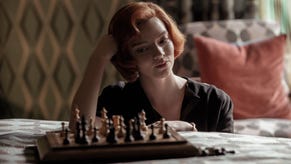The Chess Effect: How The Queen’s Gambit turned me into a chess obsessive
What a feeling, when we’re castling on the ceiling.
“I am not Beth Harmon,” I tell myself, as I stare up at the chess board on my ceiling. It’s been there for weeks now, haunting thoughts that should concern sheep, or something sufficiently dull to lull me off to sleep - but the ceiling chess board doesn’t care. The ceiling chess board beckons, tempting me with forked rooks, cheeky castles, juicy pins. The waking world isn’t safe, either; seeing people's boxy images in a Discord call gets me visualising chained pawn captures, rather than paying attention to my friends.
It’s all the fault of The Queen’s Gambit, an excellent show about an excellent orphaned chess superstar, and a chequered case of a phenomenon known as the Tetris effect. But chess is great, it turns out, and tenacious ceiling chess boards are a price worth paying.
Around two months ago, watching The Queen’s Gambit instilled me with a gentle and manageable urge to play a spot of online chess. I wasn’t alone - sales of chess sets have almost doubled since Netflix’s smash hit - but I’ve since started playing so much chess that the game has seeped into my unconscious being. I can see it when I close my eyes, sometimes, as if someone’s implanted my brain with an unwelcome portal to the chess dimension.
I’ve started playing so much chess that the game has seeped into my unconscious being. I can see it when I close my eyes.
You might have experienced something similar. The Tetris effect, along with the broader field of “game transfer phenomena”, has been well documented. It’ll be familiar to anyone who’s ever been plagued by ghostly images of falling tetrominoes, or felt the urge to load a quicksave after a real-life minor mishap. The (also excellent) video game Into The Breach once made me (momentarily) fantasise about shoving a pal into a pillar - which makes sense, seeing as both chess and Into The Breach are about weaving units between potentially deadly threats.

That deadliness is why I’m so hooked, and potentially why chess has seared its way into my subconscious. Chess is spiky, and takes no prisoners. A single oversight is all it takes for a game to spiral away from you - and, at a beginner level, most matchups tend to turn on those kinds of simple mistakes. I’ve lost more queens that I can count to sneaky bishops, lurking near the back of the board like the cowardly scum they are. Losing a hastily-placed rook has made me yelp out loud, and sent a rush of adrenaline coursing down my spine. I’m pretty sure this is what it feels like to be stabbed.
There aren’t many modern games where every decision feels so pregnant.
It’s funny, because since playing as a kid I'd come to regard chess as stuffy and boring - but I’m more engrossed now than I have been in most games for years. There aren’t many modern games where every decision feels so pregnant, and where competing plans have to be distilled into a single move that accomplishes as much as possible at once. You get this rich back-and-forth that deepens the more you play, once matches start revolving around competing ideas rather than silly mistakes.
I feel like chess exists in most people’s minds as this arcane, dry affair. Just the word summons images of jilted academics who like to quaff brandy and quote Dostoevsky, not twenty-somethings who usually get their thrills from bolshy hidden-role games and heated space diplomacy. But that’s all wrong! Deploying a devastating move in chess can be every bit as dramatic as revealing the traitor in The Resistance or backstabbing your alien allies in Cosmic Encounter. I once transformed a fatal threat to a seemingly overextended queen into a game-winning position, using the special en passant rule that lets you capture a pawn if it moves through a square where one of your pawns could have nabbed it. The exchange was electric. It made me fling my hands into the air and scream “EN PASSANT”, like William Wallace in the throes of a pseudo-intellectual midlife crisis.
I’m making it sound arcane again, I know, but the point is that chess doesn’t need to be studied to be enjoyed. The magic of online matchmaking means you can play against people who are similarly nonplussed about researching openings or reading up on tactics - but if you’re anything like me, you might just feel the itch to anyway. Chess.com has some great interactive lessons, and they’ll give you a month of free access to all their snazzy analytics if you sign up for the free trial and then cancel your subscription. Those tools provide a handy way of demystifying your losses, along with the satisfaction of getting to watch your pieces whizz around the board, à la Beth Harmon staring at a ceiling.
This is how I learned to stop worrying and love the ceiling chess board. The mark of a good game can be the way it tugs at your thoughts while you’re not playing - even if you do wind up losing sleep over it.
Dicebreaker has its own guide on how to master one of the world's oldest games. Check out our guide on how to play chess here.











